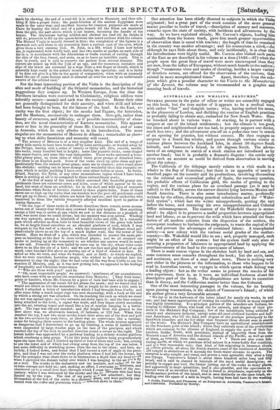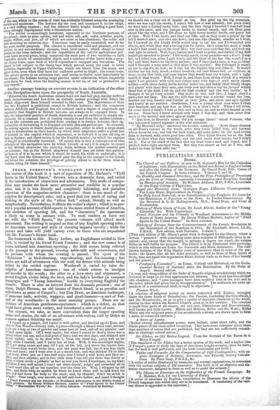AUSTRALIAN AND WHALING SKETCHES. * SEVERAL persons in the guise of
editor or writer are ostensibly engaged on this book, but the true author of it appears to be a medical man, with rather " fast " and slangish tastes ; who, baying melted his mean, in the pleasures of London, and disliking the routine of English practices or probably failing to obtain any, embarked for New South Wales. Here he knocked about in various ways. At starting, he is partner with a surgeon at one of the inland settlements ; but the climate is too good, the times and neighbourhood are too bad, to properly support one doctor, much less two ; and the adventurer sets off on a pedestrian tour in search of an opening for practice, but without success. He then engages as surgeon to a South Sea whaler, and passes through various scenes at various places between the Auckland Isles, in about 50 degrees South latitude, and Vancouver's Island, in 50 degrees North. The adven- tures of an emigrant in search of a stock station are introduced as by another hand; but it is probably a dramatic disguise : the settler only gives such an account as could be derived from observation in moving about the colony.
The California of the titlepage merely relates to a visit made in a whaler to the Bay of Francisco ; but there is an appendix of nearly a hundred pages on the country and its productions, involving discussions on the colonial and economical policy of Spain, the currency question, the probable effects of Californian gold, the modes of getting to the region, and the various plans for an overland passage (as it may be called) to the Pacific, across the narrow district lying between Mexico and South America. There is also some introductory matter, professedly written by the editor, discussing practical colonization and the "Wake- field system"; which last the writer misapprehends, putting the cart before the horse, and censuring his own misapprehension and Colonial Office mismanagement. The essence of the Wakefield theory is econo- mical: its object is to preserve a useful proportion between appropriated land and labour, so as to prevent the evils which have attended the foun- dation of all. modern colonies from the dispersion of the settlers, the consequent tendency to barbarize the emigrants, to waste the capital of the rich, and prevent the advantages of combined labour. A transplanted society—a new colony with the various social grades of the mother- country—Mr. Wakefield would like to see; and, properly managed, such might be an effect of his system : but the system itself only aims at securing a proportion of labourers to appropriated land by applying the purchase-money of the land to the conveyance of labour. There is some coarse vigour in the sketches both by land and sea, and some common sense remarks throughout the book; but the style, taste, and sentiment, are those of a man about town. There is nothing very new either in the pictures or the information, to those who happen to be read in Australian travels, or voyages in which sperm whale fishing was a leading object : but as the writer seems to present the results of his own experience, there is, as it were, an individual freshness about the descriptive part of the book. The disquisitions are better in execution than in theory, and the Californian matter better than the ColoniaL One of the most interesting passages in the volume, for its bearing upon passing transactions, is the sketch of Vancouver's Island ; of which the author gives a very favourable account.
"We lay to in the harbours of the latter island for nearly six weeks, in and out; and had many opportunities of viewing its condition, which in many respects was highly interesting. Ti,e principal portion of the islanders are Indians, be- longing to different tribes, who hunt the fur animals, and dispose of their pro- duce to the Hudson's Bay Company; few of the inhabitants being addicted to steady and stationary industry, except some old semi-civilized hunters and half- cast Americans, who till the land, and dispose of the produce principally to the Sandwich islanders and the few ships that frequent those distant seas in march of the whale. The Hudson's Bay Company have an agricultural establishment on the Southern point of the island ; where they cultivate most of the productions which are commos to the climate of England, to supply the poste of their fur- hunters, forth& North, with provisions, instead of importing them from the Western coast of America and the distant islands of the Pacific, as well as some of them, as romerly, from this country. * * • There are also some fish- curing depots, at which we purchase dried salmon in a remarkably fine condition, and at very reasonable rate; that kind of fish migrating in immense shoals, at ...dam periods, all along the North-western coast of the continent of America, ...ad caught in abundance as it ascends the fresh-water streams to spawn. The sturgeon is also caught and cured, and proves a very agreeable dish after a long sea-voyage. Vancouver's Island is about three hundred miles long and fifty broad, and is said to abound in minerals of the most useful description; es- pecially in copper sod lead, the former jutting out of the rocks in many places, and apparently in large quantities; lead is also filentiful, and the specimens ex tracted were of an excellent kind. Coal is found in abundance, especially on the North-eastern portion of the island, and is seen distinctly on the open beach, ex- tending over the space of a mile in length, having been laid bare by the washing
•
and Perils. Pastimes, and Pleasures of an Emigrant in Australia, Vancouver's California. rublished by Newby. of the sea, which in the course of time has evidently frittered away the overlaying mould and sandstone. The Indians dig the coal, and transport it to the ships, at a very trifling expense ; and the mineral burns bright, exuding a good heat, bag strongly impregnated with a bituminous matter. "The timber is exceedingly luxuriant, especially in the Northern portions of the island; such as pine, spruce, red and white oak, ash, cedar, arbutus, poplar, maple, willow, and yew, all of which are more or less abundant; the cedar and pine attaining an immense size. Limestone may be easily excavated, and fit for the most useful purposes. The climate is considered mild and pleasant, and not subject to any extraordinary changes, from local causes, which obtain in many places in the same latitude: and the capabilities of the soil for agricultural pur- poses have proved great, being composed the most part of two varieties—a dark vegetable mould of considerable depth, and a mixture of the latter with a grey- ish clayey loam, upon both of which vegetation is rampant and luxurious. The island is not subject to the damp fogs which prevail along the coast in lower latitudes, especially in Upper California, which are blown from the ocean, and stunt down, even when they have not sufficient power to blight, the cereal crops. The potato grows to an enormous size, and seems to thrive most luxuriantly on the island; the Indians having large patches under cultivation, which frequently serve them for food, when the hunting-season is not on, or not so productive as they expect."
Another passage bearing on current events is an indication of the effect of the Navigation-laws upon the prosperity of South Australia.
"Hitherto, the South Australian miners have not had fair play, having suffered much inconvenience and loss from an entirely useless privilege with which the British shipowner Ends himself invested to their cost. The importation of their ores into England is prohibited except in British bottoms; and the commerce between Adelaide and England has not attained such a degree of magnitude and regularity that freights in British bottoms are always to be engaged there. In fact, the exportable produce of South Australia is not yet sufficient to supply em- ployment for a constant line of trading vessels to and from the mother-country; and as the colonists are prohibited from sending it in foreign bottoms, their op- portunities of forwarding it to England are both rare and precarious. So situated, the mining agents in South Australia are compelled, either to allow a large stock of ore to accumulate on their hands, by which their employers suffer a great loss of interest in the capital which it represents, or to forward it in any old brig or bark to Sydney, and there reship it for the English market, by which the expense of freight is considerably increased. Of course this is only a consequence of that principle of the navigation-laws by which (wisely or not) it is sought to secure to the British shipowner the carrying trade between the mother-country and her colonies; but as the British shipowner himself does not think this particu- lar branch of it to be one which it would be worth his while to undertake, it is very hard that the Government should play the dog in the manger in his behalf, and refuse the colonists the privilege of getting others to do for them what he declines doing for them himself."



























 Previous page
Previous page